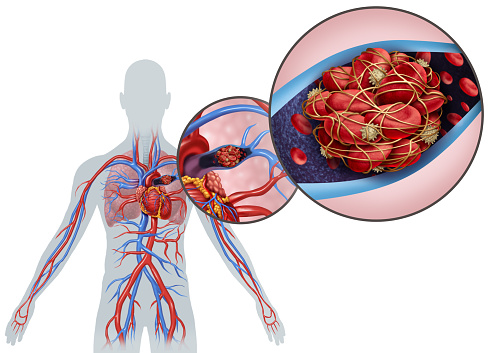When Should You Worry About Blood Clots and What Are the Best Treatments?

If you experience a cut or a small wound during your daily activities, it is best to try and stop excess loss of blood from the body. Blood clots can stop the bleeding in case of surface injuries. It also blocks the entry of bacteria and viruses.
While temporary blood clots are normal, prolonged coagulation of the blood vessel can result in life-threatening symptoms in people. Hence, it is advisable to treat clots that do not dissolve on their own.
Here are some instructions on essential identification and treatment methods for risky blood accumulations in the human body.
Table of Contents
How are Blood Clots Formed?
According to the National Blood Clot Alliance in the US, more than 274 people die every day due to untreated blood clots.
Blood coagulation or clots are formed by the platelets and the proteins in the plasma. A clot can stop excessive blood loss due to an injured blood vessel.
Most clots dissolve naturally after the injury is healed. But, abnormal blood coagulation without any injury can be dangerous. When a lump does not loosen, it can cause life-threatening health issues in people.
Types of Blood Clots
Blood can clot into a lump of mass in the arteries or veins that supply blood to the heart, kidney, lungs, abdomen, and the lower parts of the body.
Arterial Clots
Arteries are the blood vessels that carry blood from the heart to the other parts of the body. Blood coagulation formed in the arteries is called arterial clots.
These clots can lead to tissue damage, and they can cause a brain stroke or a heart attack. If you want to feel safer while encountering such diseases you should definitely consider taking an ACLS certificate which will prepare you for any unfortunate situations you may encounter.
Venous Clots
Veins carry deoxygenated blood from body tissues towards the heart for purification. The thickening of blood in the veins is called venous clots. They develop slowly and do not show symptoms faster.
The two main ways in which blood clots occur are:
Thrombus: These clots are stationery and block blood flow at a particular place in arteries or veins.
Embolus: These clots can move to other parts of the body. Hence, they can cause more damage to different organs of the body.
Symptoms of Blood Clots
Here are a few common symptoms of clotting in your blood:
- Chest pain
- Difficulty in breathing
- Heaviness in the chest
- Sweating and fever
- Severe abdominal pain with diarrhea and vomiting
- Swelling or tenderness in legs and feet
- Headache
- Dizziness
- Coughing blood
- Problems with vision or speech
- Presence of blood in stools and urine
- High blood pressure
Blood Clotting in Veins
Three types of dangerous blood clots occur in the veins.
Superficial venous thrombosis: These clots occur in the superficial veins that are present close to the skin. People who suffer from varicose veins are more likely to contract superficial venous thrombosis.
Deep vein thrombosis: Deep Vein Thrombosis (DVT) occurs when blood gets coagulated in one or more profound veins inside the body. Sitting cramped in one place for a long time, traveling long-distance, or resting on the bed after an accident or surgery can cause DVT.
Pulmonary embolism: A DVT that breaks out and travels to other parts of the body can cause pulmonary embolism (PE). This blood clot is a medical emergency and should be immediately treated by an expert doctor.
Diagnosis and Treatments for DVT and PE
Various methods can diagnose DVT and PE.
- A blood test for D-dimer, a protein produced by blood clots, can verify DVT.
- An ultrasound test that uses sound waves can take pictures of the affected veins. It is a standard test for diagnosing DVT or PE.
- You can use venography, which creates an X-ray of the damaged veins to determine the presence of DVT or PE.
- DVT in the abdomen region can be identified with an MRI scan.
- A ventilation-perfusion scan (V/Q scan) can be used to test the blood flow and airflow in different parts of the body. These can check the symptoms of PE.
You can treat DVT and PE in the following ways.
- Oral blood thinner or IV-injected ones can help treat blood clots. These anticoagulants can curb the growth of the clots and prevent further damage.
- Clot busters are administered for severe DVT and PE in patients. These drugs called thrombolytics are injected directed into the clots.
- Vein filters are used to treat extreme cases of DVT and PE. Here, a filter is placed in the main vein of the body called the inferior vena cava, which passes from the legs to the right side of the heart.
Conclusion
An untreated blood clot can pose a threat to your health. It is advisable to contact the nearest vein treatment center in the US to address the issue at the earliest.


